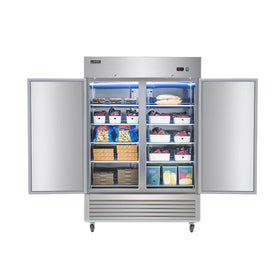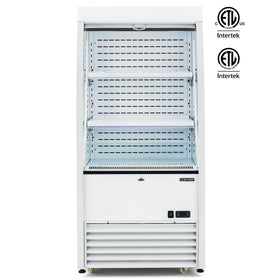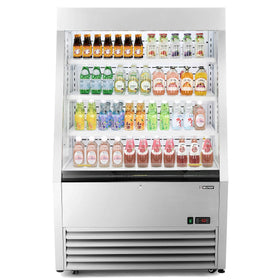When you are in the food retail and service industry, there are two main priorities: keeping your products chilled and making them visible to consumers. This is why most businesses in this sector use display refrigerators and open-air merchandisers. These are probably the two most popular choices for showcasing perishable products, and they generally serve the same purpose and are ideal for use in different kinds of shops or scenarios.
However, they are not the same, and if you are in the market for a commercial refrigerator for your business, it is important to understand which of these two would be ideal. In this article, we'll explore the pros and cons of each to help you make an informed decision.
What is a Display Refrigerator?
A display refrigerator, also known as a glass-door refrigerator, is an enclosed unit that has a transparent door that allows customers to view the contents while keeping the cool air inside. These types of refrigerators are most common in grocery stores, convenience stores, and delis because they are ideal for showcasing drinks, pre-packaged foods, and other refrigerated products.
Key Features of a Display Refrigerator
The Glass doors
The key and most distinguishing feature of a display refrigerator is its glass door. These doors are made with see-through glass in order to provide visibility of products while maintaining a sealed, cold environment.
Wilprep’s Commercial Glass Door Reach-In Refrigerator, for example, is a smaller model with a single glass door. It stands 27 inches and has a total capacity of 18.7 cu. ft, making it a perfect fit for your small business. For bigger models, you can always check the Commercial Merchandiser Refrigerator, which has two doors and a capacity of 42.2 cu. ft, or the Commercial Display Refrigerator, which has three glass doors and a total capacity of 27.4 cu. ft.
The System is Enclosed
Unlike open-air merchandisers, the door of a display refrigerator remains closed unless accessed. This ensures minimal loss of cold air and prevents entry of warm air which could cause frosting. Though Wilprep refrigerators come with an auto-defrost function, having the glass prevents air from escaping, which is important.
More Accurate Temperature control
Because they are sealed, display refrigerators are often efficient at maintaining consistent temperatures. With any Wilprep refrigerator, irrespective of size, number of doors, or capacity, you would be able to easily adjust temperatures anywhere between 32-50°F, allowing you to display a wider variety of goods.
Pros of Display Refrigerators
They are Energy Efficient
The door of a display refrigerator remains closed, which is great for energy efficiency. Since the unit is enclosed, the cold air stays inside, meaning the interior remains cold, and the refrigeration system does not have to work as hard to keep it that way.
Wilprep’s Commercial Display Refrigerator is a large supermarket-sized model with three doors and a total capacity of 52.4 cu. ft, but it consumes only 6.5 kWh/24h. It is built with a high-density insulation layer and low-E tempered glass doors, offering excellent thermal insulation. The door also automatically closes at 90° or less to prevent energy waste.
The Goods are Protected
The appearance of the items on display is crucial for any retailer in the food industry. The products have to look fresh, clean, and healthy, and a display refrigerator helps you achieve this with aplomb.
The closed design reduces exposure to external elements like dust, dirt, or temperature fluctuations, keeping products fresher, cleaner, and healthier for longer.
A Display Refrigerator Enhances Visual Appeal
In the United States, where 73% of customers say the majority of their purchases are unplanned, businesses understand that the more visible a product is, the higher the chances of making sales. This is one major reason why businesses in the food industry use display refrigerators. The transparent doors allow customers to easily see the items inside without opening the door.
Temperatures are More Stable
With less warm air entering the refrigerator, display refrigerators tend to offer more stable and consistent cooling, which is important for perishable goods.
Minimal Risk of Theft
Display refrigerators are, by nature, more secure. Moreover, if you get an advanced model from a top supplier like Wilprep, it will come with locking mechanisms that can be added to the glass doors. This is an effective way to control who has access to the contents, which is particularly important in retail settings or when stocking alcohol.
Cons of Display Refrigerators
Limited Access: To retrieve an item, a Customer must open the door. This can sometimes cause delays during peak hours when many customers are shopping.
Higher Initial Cost: A display refrigerator can be more expensive upfront than an open-air model, particularly if it has energy-efficient features or custom designs.
WHAT IS AN OPEN-AIR REFRIGERATOR?
Open-air refrigerators are similar to display refrigerators, except that they do not have any doors. The objective of an open-air refrigerator is to allow customers not only to see the products but to be able to access them directly without any barriers. These are the types typically seen in supermarkets, convenience stores, and bakeries, used to display everything from beverages to produce and grab-and-go meals.
Key Features of an Open-Air Refrigerator
Open-front design: An open-air refrigerator has no doors or barriers, so the products are directly accessible to customers.
Air curtain technology: The cooling system in an open-air refrigerator works differently. The cold air flows to the front and creates a “curtain” that helps maintain cool temperatures inside.
Display shelves: Open-air refrigerators often have multi-tiered shelves to maximize display space for a wide range of products. Wilprep’s …has
Pros of Open-Air Refrigerators
Ease of Access
The main advantage of an open-air refrigerator is that customers can grab products quickly without the need to open doors, making the shopping experience more convenient, especially in high-traffic environments.
Easier Sales
With an open-air merchandiser, your business can benefit even more from impulsive purchases. The open nature of these refrigerators eliminates any barriers to impulse buying, as customers can easily see and grab products.
Wilpreps Vertical Open Air Merchandiser goes an extra step to increase the appeal of your offerings with captivating built-in LED lights that make your snacks, and drinks or other food offering irrestible to potential buyers.
Great for Grab-and-Go
If your business revolves around convenience, such as selling sandwiches, drinks, or salads, an open-air unit allows for quicker, smoother transactions.
A Flexible Design
Open-air refrigerators come in various configurations, from small units to large, multi-deck setups. No matter the size or structure of your business, you can get one that fits.
With Wilpreps Open Air Merchandiser, you can customize your display possibilities with 2 adjustable shelves and a 6.7 cu. ft. volume. With its smaller size, it is ideal for convenience stores, grocery stores, cafes, and more!
Cons of Open-Air Refrigerators
They Can be Energy Inefficient
Without doors, cold air easily escapes, forcing the refrigeration system to work harder to maintain the temperature. This results in higher energy consumption compared to closed-door units.
Temperature Inconsistency
An open-air refrigerator is more susceptible to fluctuations in temperature, especially if the environment in your store is warm, or if there is high foot traffic near the refrigerator. This can sometimes lead to uneven cooling and potential spoilage.
Impact on Product Lifespan
With an open-air refrigerator, the products are more exposed to ambient air, and they may not stay fresh as long as they would have in a display refrigerator. If you mainly deal in perishables like dairy or pre-prepared meals, your products may have a shorter shelf life in an open-air refrigerator.
Display vs. Open-Air Refrigerators: Main Differences
|
Feature |
Display Refrigerators |
Open-Air Refrigerators |
|---|---|---|
|
Accessibility |
Doors limit access; require customers to open them |
Direct access; no barriers to products |
|
Energy Efficiency |
More energy-efficient due to a sealed environment |
Less energy-efficient; cold air easily escapes |
|
Temperature Stability |
More stable, consistent cooling |
Prone to temperature fluctuations |
|
Customer Convenience |
Requires extra step to open door |
Easier and quicker for grab-and-go shopping |
|
Upfront Cost |
Higher initial cost |
Lower upfront costs, but higher operational costs |
|
Product Visibility |
Clear visibility, but the door can fog up |
Full product visibility at all times |
|
Operational Cost |
Lower operational cost due to energy efficiency |
Higher operational costs due to energy use and restocking needs |
|
Best Suited For |
Products that need strict temperature control |
High-traffic areas with grab-and-go products |
Check Out These Models of Display Refrigerators
Wilprep display refrigerators are ideal for visually displaying products. These displaying units are designed not only to display products but also to enhance their appeal, even at night or in other low-light conditions.
The refrigerator units also come with anti-fogging glass ensuring that it never gets hard for customers to see your products.
They come with locking mechanisms that can be added to the glass doors. This is an effective way to control who has access to the contents, which is particularly important in retail settings or when stocking alcohol.
Which One Is Right for Your Business?
Choosing between a display refrigerator and an open-air refrigerator depends on the nature of your business, the types of products you're selling, and your energy efficiency goals. Here are some guidelines to help you make the decision:
Choose Display Refrigerators If
- You prioritize energy efficiency and lower operational costs.
- Your products require consistent and stable temperatures (e.g., dairy, meat, or deli items).
- You’re concerned about product freshness and longevity.
- Your store isn’t focused on high-volume, quick transactions.
Choose Open-Air Refrigerators If
- You run a grab-and-go operation with high foot traffic, such as a convenience store or fast-casual restaurant.
- You want to encourage impulse purchases by making products easily accessible.
- You sell items with short shelf lives or high turnover rates, like pre-packaged meals, drinks, or snacks.
- Energy efficiency is less of a concern, and convenience is your top priority.
Conclusion
Both display and open-air refrigerators offer unique advantages depending on the application. Display refrigerators are excellent for maintaining energy efficiency and temperature control, while open-air units provide unparalleled convenience and accessibility. Ultimately, the best choice will depend on your specific business needs, customer behavior, and the types of products you want to showcase.









